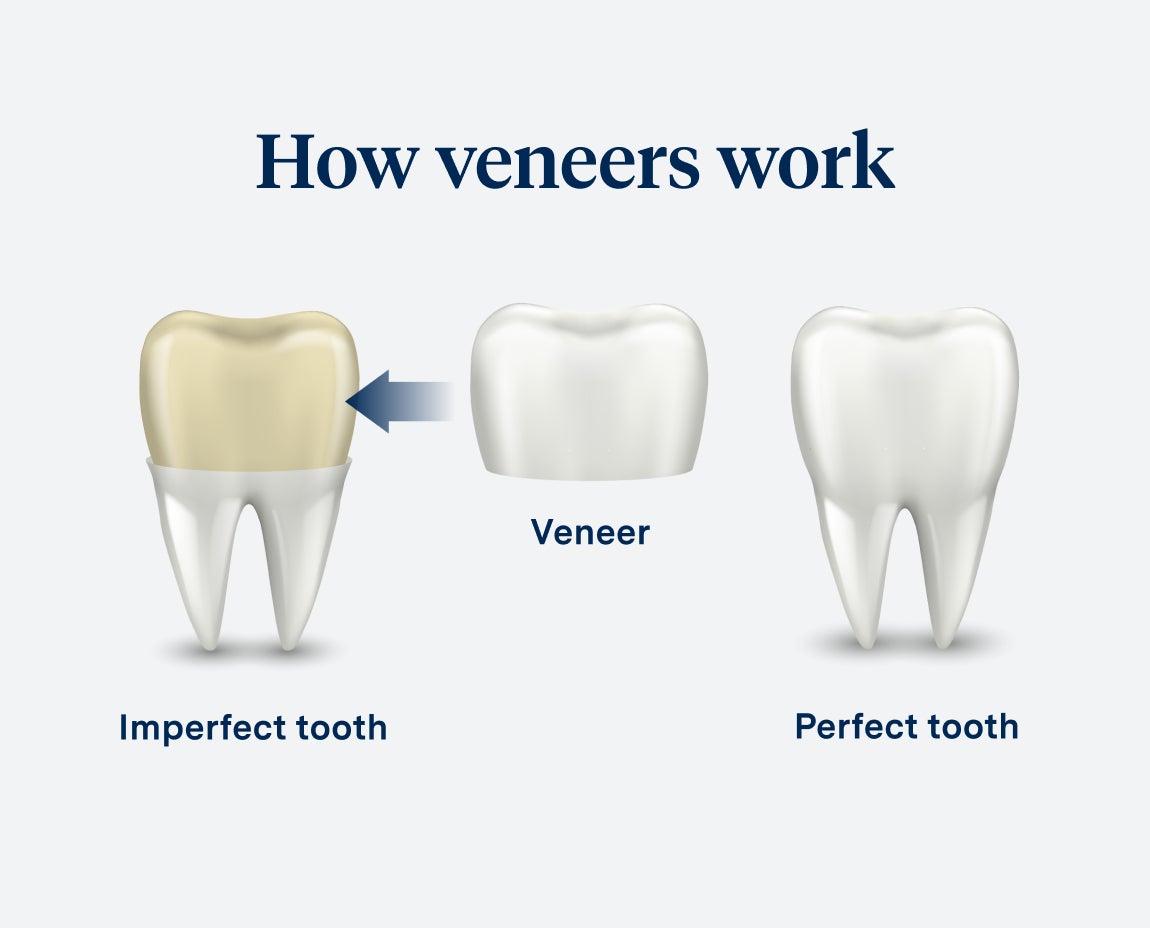Last updated 07.25.2024
The pros and cons of dental veneers
Discover the benefits and drawbacks of choosing dental veneers as a cosmetic dentistry option to enhance your smile.

Ever wondered about the secret behind those perfect smiles? Dental veneers might be the answer. Dental veneers have become a highly sought-after method for achieving a beautiful and confident smile, offering an aesthetic and efficient solution for several cosmetic dental issues. They are thin, custom-made shells crafted from porcelain or composite resin materials, designed to cover the front surface of teeth, enhancing their appearance. While veneers present a fantastic opportunity to improve your smile's aesthetics dramatically, it's important to carefully consider the pros and cons before proceeding.
On the plus side, veneers can instantly correct a wide range of dental imperfections such as stains, chips, gaps or misshapen teeth. They require less enamel removal than crowns, making them a less invasive option. Additionally, the materials used are highly resistant to staining, helping your smile stay brighter for longer.
However, the process of applying veneers is irreversible, and in some cases, it might make your teeth slightly more sensitive to hot and cold temperatures due to the removal of a small amount of enamel. The cost can also be a significant consideration, as veneers tend to be on the expensive side of dental treatments.

What are dental veneers?
Dental veneers are thin, custom-crafted shells designed to snugly cover the front surface of your teeth, instantly enhancing their look. Whether they're made from porcelain or resin composite materials, these shells are expertly bonded to your teeth. This transforms their color, shape, size or length.
Veneers offer a remarkably natural appearance. They also provide a solution to numerous dental concerns and the entire procedure is relatively quick and simple. For a deeper dive into how dental veneers can transform your smile, make sure to visit our Dental Veneers page.

Pros
When you're looking to brighten and enhance your smile, dental veneers stand out as a choice worth considering. Let's dive into the advantages that make them so appealing:
Durability
Veneers, especially those crafted from porcelain, are not just durable but designed to withstand the rigors of daily life. This means they can serve you well for many years, provided they receive the care they deserve.
Realistic appearance
One of the remarkable qualities of veneers is their ability to mimic the natural sheen of your teeth. Porcelain veneers, in particular, reflect light just like your real teeth, ensuring that your smile looks as natural as possible.
Minimally invasive
What sets veneers apart in the world of cosmetic dentistry is their minimally invasive process. Only a thin layer of enamel is modified, preserving the integrity of your natural teeth while achieving the desired aesthetic effect.
Easy maintenance
Caring for your veneers is as straightforward as caring for your natural teeth. Regular tooth brushing, flossing, and dental checkups are all it takes to keep your veneers looking their best.
Long-lasting
With the right care, your veneers can be a long-term solution to cosmetic dental concerns, potentially lasting between 10 to 15 years.

Cons
While dental veneers offer a range of benefits, it's important to approach this dental solution with a full understanding of its limitations, to help you make an informed decision.
Increased risk of sensitivity
Some individuals may notice their teeth become more sensitive to hot or cold temperatures following the application of veneers. This is usually a temporary effect, but it's worth considering if you already experience tooth sensitivity.
Irreversible
Remember, applying veneers involves an irreversible process where a portion of your enamel is removed. This means once you opt for veneers, there's no turning back. It's a long-term commitment for your smile.
Not for badly damaged teeth
If your teeth are significantly damaged or decayed, veneers might not be the best option. In such scenarios, your dentist might recommend alternatives like crowns or implants that are better suited for restoring dental health and function.
Can be costly
Veneers can be a considerable financial investment. While they bring long-term improvements to your smile and confidence, the initial expense is something to carefully consider. Ensure it aligns with your budget and dental care goals.

How much do veneers cost?
The cost of dental veneers can vary based on several factors, including the type of material used, the complexity of the case, and the dentist's expertise. Different types of veneers, such as porcelain and resin composite, come with varying price points. For more detailed pricing information, visit our Veneers Cost page.

Are dental veneers the right choice?
Dental veneers have become a go-to in the world of cosmetic dentistry, offering a path to that perfect, natural-looking smile we all desire. But are they the best fit for you? This is something that hinges on your dental health, lifestyle and what you personally want from your smile.
To find out if veneers are your golden ticket to confidence, we recommend a one-on-one chat with a dental expert. Why not book a consultation with Aspen Dental? Together, we can explore your options and help you make a choice that's informed and right for you.
Other veneers questions to consider
Can dental veneers replace old crowns?
No, dental veneers cannot replace old crowns. They are designed to cover the front surface of teeth, while crowns encase the entire tooth structure. If you have old crowns that need replacement, it’s best to consult your dentist for appropriate options.
How long do veneers last?
With proper care, veneers can last between 10 to 15 years. Regular dental check-ups and good oral hygiene are essential for maintaining their longevity. For more information, visit our How Long Do Veneers Last page.
Can you go back to normal teeth after getting veneers?
Once the veneers are placed, the process is irreversible due to the removal of enamel. Therefore, you cannot return to the state of your natural teeth without some form of restorative dental work.
Which type of veneers look the most natural?
Porcelain veneers are renowned for their natural appearance. They mimic the light-reflecting properties of natural teeth and are custom-made to match your existing teeth's color and shape.

Unlock your brightest smile with dental veneers
Dental veneers offer a fantastic way to brighten your smile, combining versatility with effectiveness. They bring several advantages to the table. However, it's important to pause and consider their limitations. Engaging in a thoughtful discussion about the pros and cons with a dental expert can help you make a choice that fits your smile goals perfectly. For tailored advice and to discover if veneers are your best match, book a visit with Aspen Dental today. Let's take the next step towards a smile that feels just right for you.
Schedule Appointment >



